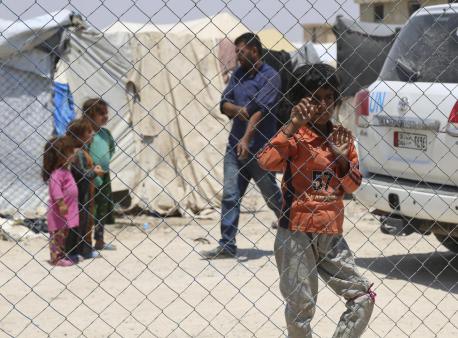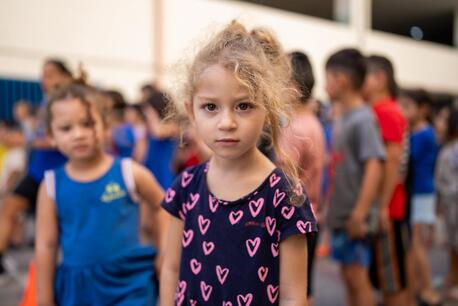
Tens of Thousands of Children in Syria's Al-Hol Camp Need Help Now
UNICEF and partners are working tirelessly all over the world to save and protect children.
As summer temperatures soar, UNICEF is on the ground, providing immediate lifesaving assistance to more than 70,000 people — an estimated 90 percent of whom are women and children — facing a dire humanitarian situation in Al-Hol camp in northeastern Syria near the Iraq border. Fleeing violence in the region, they've taken shelter in a sea of white canvas tents lined up in endless rows in the desert.
"It took us nine days to arrive to Al-Hol from Baghouz," said 14-year-old Afraa, originally from Iraq, as she waited for her younger sibliings to be examined by a doctor. "I don't know what will happen to us."

Nearly 20,000 of the children living in Al-Hol camp are Syrians; the rest — 29,000 — come from 62 different countries, including 9,000 from Iraq. Most are under the age of 12. Many of the children are survivors of heavy fighting and have witnessed unimaginable atrocities.
UNICEF is working with partners and donors to provide the children of Al-Hol with everything from basic services and protection to Child-Friendly Spaces where they can talk to someone kind.

"Thousands of boys and girls in Al-Hol have never had a chance to simply be children," said UNICEF Representative in Syria Fran Equiza (above), after a visit to Al-Hol camp last week. "These are children. They deserve the utmost care, protection, attention and services. After years of violence, they are unwanted, stigmatized by their local communities or shunned by their governments."

Since the beginning of the year, mobile health and nutrition teams supported by UNICEF and World Health Organization have been providing vaccination and nutrition services to children in Al-Hol camp through fixed clinics and mobile health units. Health workers screen children for malnutrition and common illnesses, provide nutrition supplements and refer urgent cases to hospitals in nearby Hassakeh. Above, a health worker examines a sick child in a UNICEF-supported mobile health unit.

At a UNICEF Child-Friendly Space, Equiza visited with traumatized children who were playing chess. The centers offer children a brief respite from the hardships and terror they've experienced growing up in a war zone.

In another tent, Equiza led a cooperative game where children standing in a large circle passed an invisible package from one child to the next, then two packages going in opposite directions. Excited and laughing, they worked together to make sure their packages made it quickly all the way around the circle.

Many of the children living in Al-Hol have no memory of a time before the violence began. Above, a child and a caregiver perform a puppet show in one of the UNICEF Child-Friendly Spaces where children go to play, draw and share some quiet time. UNICEF is supporting learning spaces at the camp serving 3,000 children and reaching nearly 12,000 children with recreational activities, counseling, case management and special care for separated and unaccompanied children.
The children living in Al-Hol camp have the right to be safeguarded, including legal documentation and family reunification. Over the past months, at least 520 unaccompanied children or separated children have been identified, and 214 have been reunited with family members. Another 74 children are being hosted in interim care sites while the search for surviving family members continues.

The delegation visited a water purification station installed by UNICEF in the camp, above. On a daily basis, UNICEF and partners are providing nearly 450,000 gallons of safe drinking water and 200 gallons of water for domestic use. Water consumption rises during the summer, so securing sufficient water quantities to cover the increase in demand will continue to pose a challenge.
"This is a drop in the ocean," said Equiza. "Much more needs to be done to continue providing children with basic services and protection including reintegration into their local communities and safe return to their home countries."
UNICEF is calling on all member states involved to act in the best interests of the child and to take full responsibility for the reintegration of children into their local communities and the safe repatriation of children back to their countries.
UNICEF is also calling on all parties to the conflict in Syria and those who have influence over them to facilitate unconditional humanitarian access to and inside Al-Hol and everywhere in Syria to reach every child in need, wherever they are.
To continue providing assistance and support to children and families in the camp and to scale up operations to meet their needs, UNICEF is appealing for US $9 million.
Help UNICEF deliver urgently needed lifesaving assistance to vulnerable children.
Top photo: Nearly 50,000 children displaced by violence have sought shelter in Al-Hol camp in northeastern Syria. UNICEF is working with partners and donors to provide these children with immediate lifesaving assistance as summer temperatures soar. All photos © UNICEF / Ahmad Hawas
HOW TO HELP
There are many ways to make a difference
War, famine, poverty, natural disasters — threats to the world's children keep coming. But UNICEF won't stop working to keep children healthy and safe.
UNICEF works in over 190 countries and territories — more places than any other children's organization. UNICEF has the world's largest humanitarian warehouse and, when disaster strikes, can get supplies almost anywhere within 72 hours. Constantly innovating, always advocating for a better world for children, UNICEF works to ensure that every child can grow up healthy, educated, protected and respected.
Would you like to help give all children the opportunity to reach their full potential? There are many ways to get involved.





